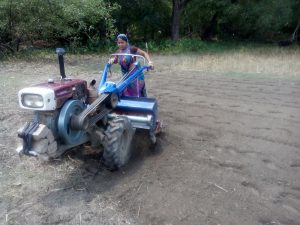
In Bangladesh, women disproportionately face social stigmas regarding appropriate behaviors and working roles which often keep women out of entrepreneurship and leadership roles and limit their roles to household chores like child-rearing and cooking. These restrictions have kept many women from reaching their maximum potential and contributing fully to the economy, especially in the agricultural sector, which has long been limited by the restricted participation of women.
However, this is changing. The Cereal Systems Initiative for South Asia – Mechanization & Irrigation project (CSISA-MI) is leading initiatives to drive women towards empowerment and agricultural entrepreneurship. CSISA-MI is creating local service providers (LSP) in southern Bangladesh to scale out agricultural mechanization through efficient service provision. CSISA-MI is led by the International Maize and Wheat Improvement Center (CIMMYT) and funded by the United States Agency for International Development (USAID).
Before the arrival of appropriate-scale machinery, such as the power tiller operated seeder (PTOS), seeding jute had been a daunting venture in Baliadangi in Rajbari District. The fatiguing task of preparing land for seeding, sowing seeds by digging soil and simultaneously planting posed a nearly insurmountable challenge. Today, Dipty Roy, a female LSP from the small village of Taltola, Baliadangi pushes her PTOS forward and effortlessly seeds her jute.
Roy has become a repository of knowledge concerning seeds because of her role in the operations of the seeder. She, like 74 other female LSPs, upon gaining PTOS training from CIMMYT, plans to not just be a machinery owner, but leap onto business ownership. As a successful PTOS service provider with high hopes and ambitions, Roy aspires to build a business where she employs and trains machinery operators and makes a larger contribution to agriculture.
“There is something magnificent about running one’s own business. The overwhelming feeling of taking charge and making an invaluable contribution would speak volumes for my personal growth and economic standing,” says Roy.
The channeling of resources, endeavors, hopes and optimism towards the development of women entrepreneurs has now become paramount. CIMMYT through CSISA-MI in USAID’s Feed the Future zone in Bangladesh empowers rural women to advocate for and serve the needs of their employees, to provide machinery operation training, to estimate costs and benefits and run a viable machinery driven business. The emergence of women entrepreneurs in agriculture is powerful- it can propel the rural population into self- sustaining individuals who can effectively take charge of a business and catalyze the development of the economy.
As they move closer to shattering the once impenetrable glass ceiling – they are now leading the way for a new generation of women LSPs who aspire to hold entrepreneurship roles in Bangladeshi agriculture.
The Cereal Systems Initiative for South Asia is funded by the United States Agency for International Development (USAID) and the Bill and Melinda Gates Foundation (BMGF) and is led by the International Maize and Wheat Improvement Center (CIMMYT) and implemented jointly with the International Food Policy Research Institute (IFPRI) and the International Rice Research Institute (IRRI).
 Capacity development
Capacity development